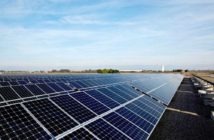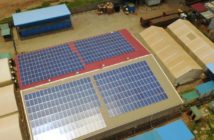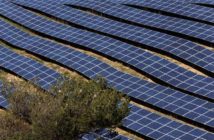BBC NEWS
By Matt McGrath
 Science reporter, BBC World Service
Science reporter, BBC World Service
Desertec had ambitious plans to deliver electricity from renewable sources to Europe via undersea cables
But three years later, the project has little to show for its efforts. Two large industrial partners, Siemens and Bosch, have decided they will no longer be part of the initiative.
According to Dr Daniel Ayuk Mbi Egbe, a professor at the University of Linz in Austria and an expert on African solar resources, this is not good news.
“Siemens and Bosch are very big companies,” he told BBC News, “if they don’t want to support this initiative it is going to be difficult for Desertec.”
It seems some governments share this reluctance to go forward.
One of the first concrete steps that Desertec announced was a plan to build three solar power plants in Morocco. A declaration of intent was due to be signed recently by a group of countries including Spain and Italy. But the Spanish government demurred, citing difficulties in finding the subsidies the project would need.
Hans-Josef Fell is a Green party MP in the German parliament who has sponsored renewable energy legislation. He’s sometimes referred to as the father of the feed-in tariff that has helped wind and solar power succeed in Germany. He thinks the Desertec initiative is too reliant on public subsidies.
“The governments get cold feet for one reason, Desertec needs too much support in tax money – all the public budgets are over borrowed – and tax money is not easily available,” Mr Fell said.
A solar power plant in Morocco uses mirrors to concentrate rays from the sun
Desertec says that these are small problems and will not detract from the overall success of the project. Spokesman Klaus Schmidtke told BBC News the initiative is in good shape.
In reference to the problems with Spain he said: “We are talking about a declaration of intent between some government so the Desertec initiative is not involved in these negotiations – these are done by the governments. There is no reason for us to fear any problems.”
But others are not so sure. Prof Peter Droege is the head of Eurosolar, the European association for renewable energy.
“I think it is struggling to find a reason to continue – It is clear it’s lost its original purpose, it is looking for a new direction,” he commented.
“One of the main attractions of renewable is to become energy independent,” he said.
“If you have tied yourself to another external source you have to pay for, you are missing the entire point of the renewable energy transition we are in.”
Concentrating solar power technology has been proven in many parts of the world including at this plant in California
There have been worries that the unstable political situation in North Africa is also causing concerns for investors and for governments. But according to Daniel Ayuk Mbi Egbe, the problem is more fundamental.
“The fathers of Desertec say their aim was to exploit North African energy for the European market,” he says, “but what about Africa itself?”
He added: “When you go to many African countries there are constant electricity cuts – if you want to help then you need to think not just about exporting to Europe but about supplying Africa as well.”
One positive element for the project is that there have been suggestions that China might be willing to invest so that it can get access to technology. It is interested in learning how to use high-voltage direct current cables such as those proposed for bringing power across the Mediterranean.
Green MP Hans-Josef Fell says they could be just what Desertec needs.
“China’s money could help, China wants the know how. Yes perhaps China could save the project, they are very potent,” he told BBC News.
.






